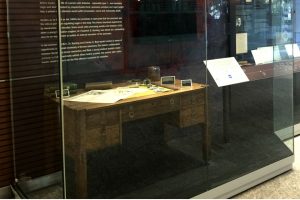
In 1922 Frederick Banting, a Canadian researcher at the University of Toronto, discovered how to isolate, produce and then use insulin to treat young children with Type 1 diabetes. Today, 14 November (Banting’s birthday) is recognised as World Diabetes Day and I, the parent of a son with Type 1 diabetes, am on posting in Toronto, where insulin was discovered.
Today is World Diabetes Day, a day of action sponsored by the International Diabetes Federation (IDF) and marked in over 160 countries by associates of the IDF, governments, NGOs, families and individuals to raise awareness of diabetes.

There are three types of diabetes. Type 1, sometimes called juvenile diabetes, results from the failure of the pancreas to produce insulin. The exact causes of this are not known but it usually occurs in young children and is thought to be linked to genetic or environmental factors. The second type, Type 2, begins when the pancreas develops insulin resistance, because of diet and lifestyle. The third, gestational diabetes, can occur during pregnancies.
The IDF estimates there are 415 million people with diabetes worldwide. Current estimates for the UK, from Public Health England, show 3.8 million people, or 9% of people over the age of 16, living with diabetes in 2016 (estimated to rise to 6.2 million by 2035). This means that approximately 35,000 civil servants could be living with diabetes.
However, there are many examples of people who show it will not stop them having a successful life. The actress Halle Berry, musician Nick Jonas, US Supreme Court Justice Sonia Sotomayor and footballer Gary Mabbutt all have Type 1 diabetes. Prime Minister Theresa May was diagnosed with Type 1 diabetes in 2013.
These examples inspired my son, diagnosed aged 2, to understand his condition and how he can manage it and we help him. Diabetes still requires careful control. Too much blood sugar risks blood poisoning. Too little, risks a diabetic coma. It has been a journey with many ups and downs: pride in seeing him take control, excel at school and in sports, tempered with three hospitalisations for early stage blood poisoning, the bleariness of parental blood tests at 2am, and keeping insulin cool during a tropical storm power cut!
We’ve benefited from excellent Foreign Office support throughout. Line managers have understood when I’ve asked for flexibility to work from home. Health & Welfare have provided excellent support, equipment and advice through two postings, without which it would have been impossible to continue my career. Michael, my wife and I are very grateful for that.
But this is about more than staff support. A cure will only be found through global collaboration and innovation.
I am confident it will be and that the UK will play a big role as a leading diabetes researcher. Cambridge University is conducting extensive research on an artificial pancreas and the algorithms needed to match how the human body controls blood sugar levels. The NHS has established a stem cell ‘factory’ in Liverpool to treat people at high risk of developing diabetes-related kidney problems. In Canada, the Sick Kids hospital (equivalent of Great Ormond Street) is working on finding a cure and I am helping them connect with relevant UK researchers.
Meanwhile I, colleagues in Enable (the FCO Disability Association) and others will continue to do what we can to promote a better understanding of diabetes, the search for a cure and how it is no impediment to a successful life.
For further support, contact your local disability employee network or, if there isn’t one, the Civil Service Disability Network, who can help to set one up.

4 comments
Comment by MIke posted on
I have been living with type 1 Diabetes for over 47 years and am now on an insulin pump. As I previously said the civil service is a good employer concerning disability issues. The first thing I would say is people need to understand exactly what the word diabetes means in the fact that it effects different people in different ways, and now it costs so much money that some of the expensive things are only given to people that pay for them so you cannot always compare a star with a normal working person.
Comment by Gavin Thomas posted on
Thanks Kevin for a great blog. I worked with a colleague who was a diabetic and as long as he took his meds and was careful with what he ate, he was able to live life to the full and be effective at work.
I would agree with you that the FCO has been fantastic in supporting its staff when the need has arisen and you have proven that with reasonable adjustments in place, that you are able to carry out role efffectively.
Comment by Paul posted on
Hi,
Good piece - one minor gripe... Type II Diabetes is not just because of "because of diet and lifestyle" there is a large genetic component that modifies susceptability.
As a Type II Diabetic, the CS has been a good employer to me to - and for my other disabilities.
Cheers
Paul
Comment by Sue posted on
I echo Paul's comment above. We need to counter this assumption that Type II is somehow self-inflicted by a bad diet or unhealthy lifestyle. My husband was diagnosed with diabetes 17 years ago aged 42, but as his pancreas still produces a small amount of insulin, he is not Type I. Others in his family also have diabetes, so in his case there is likely to be a genetic cause. He certainly didn't have a poor diet or lifestyle.